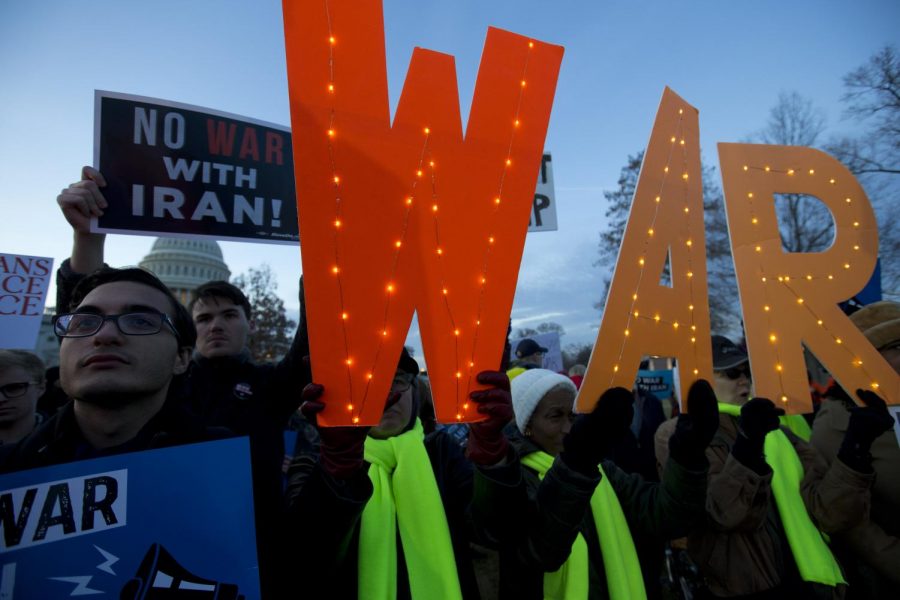Opinion: The Trump administration’s foreign policy is all over the place
Demonstrators protest outside of the U.S. Capitol, during a house vote to measure limiting President Donald Trump’s ability to take military action against Iran, on Capitol Hill, in Washington, Thursday, Jan. 9, 2020. (AP Photo/Jose Luis Magana)
January 26, 2020
In the wake of the assassination of Iranian Major General Quasem Solemani, warmongers and certain anti-Iranian elements have made quite a bit of noise about Iran’s state sponsorship of terror, trumpeting it as an inherent casus belli and an immovable justification for the unilateral act of aggression undertaken by President Trump.
However, even a cursory glance at President Trump’s foreign policy tells us the heightened aggression with Iran bases itself in political expediency rather than a genuine outrage at the loss of American life.
There is a marked difference in the way President Trump has conducted himself with regard to other state sponsors of terror, namely North Korea and Saudi Arabia. North Korea, whose anti-American rhetoric dwarfs Iran’s, was met by President Trump with a seemingly genuine willingness to negotiate a peaceful solution. Meanwhile, Saudi Arabia, one of America’s staunchest middle eastern allies, has proved treacherous time and time again, from the brutal murder of Jamal Khashoggi to their funding of the 9/11 hijackers.
The Trump administration’s attitudes toward these two countries stands in marked contrast to their foreign policy objectives with Iran.
The 2015 nuclear deal, a landmark piece of diplomacy indicating a reciprocity never shown by North Korea or Saudi Arabia, was torn up by the Trump administration with zero regard for its impact on U.S. foreign policy in the region, Iranian attitudes towards the USA or the signal it sends other unfriendly governments about their nascent nuclear weapons programs.
The Trump administration has zero diplomatic replacement for the nuclear deal. The State Department, gutted as it is, has neither the resources nor the directive to negotiate a replacement deal. President Trump’s attitude toward Iran has been one of unchecked aggression.
The assassination of Solemani, plain and simple, was hypocritical. In certain instances, President Trump has displayed an eagerness to negotiate with state sponsors of terror some jaded observers would characterize as naivete. However, when war seems politically expedient, or even a good distraction from the president’s impeachment, President Trump is exceptionally willing to cry havoc and let slip the dogs of war.
The hypocrisy is further compounded when the rationale for Solemani’s assassination is examined.
The air strike was ostensibly carried out as a retaliation for the killing of an American contractor by Hezbollah.
The Trump administration is silent when Mohammed bin Salman hacks an American journalist to death inside his embassy, but a terrorist organization’s unilateral actions demand retaliation against a government that is, at best, tangentially connected? For this administration, political expedience comes before America’s best interests, which is an unacceptable way for America to conduct its foreign policy.

















